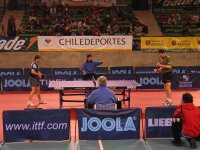The only things that clearly and immediately get rewarded when you improve technique are your serves and serve returns. When you think about it, they are the only things that guaranteed to show up in a point. But to go beyond that, you aren't going to improve much if you focus on all these general, vague things like timing issues etc. You need to get down to addressing the question of how you win and lose points. And whatever is winning points has to be shored up by forcing the opponents to play into it more, and whatever is losing points has to be shored up by fixing it or designing plays that avoid it. I remember Paul Drinkhall saying I think in an interview with Ben Larcombe that ultimately, you need to be practicing things that win you matches. If a World Class player is saying this, there has to be a lesson in there for all of us.
A common comment from many people is that I play a lot because I started posting a lot of my practice on youtube. In a sense, it is true, but what really happened was that I got to about 1950 or so and that my auto-immune arthritis is such that I can never really tell how bad it will get before it gets too hard to continue playing so last year, I spent the last 3 months investing heavily in league and tournament play so that I could break 2000 while I was sure I would still be healthy enough to do so. If I didn't play that much, or I even played only twice or thrice a week, I am sure I would have broken 2000 eventually if I stayed healthy enough, but that is the problem - I never knew so I didn't want to risk it.
After this, I got lucky that a guy who liked to train moved into my area so I used the opportunity to rebuild my forehand so that it could be more technically solid (I mean, I broke 2000 with it. so it wasn't like I had no forehand, it was more about what I could do with it and where I wanted to go). I have learned that training a lot takes a physical toll on one's body if one pushes it for many hours, so the advantages for an aging or diseased amateur without all the therapy and care a pro gets can be overestimated. Also, having too much training time can make you lose focus. I spend way too much time looping into block at my club, when I need to be doing more random drills. Thankfully, I got a robot, so I play less (yes, less) and I go into the club a few times to use the robot.
While my forehand strokes are technically sounder in 2015 and I can play more players in ways that I couldn't before, my results are largely unchanged other than that I am losing far less to worse players and beating them more easily. What I took from that was that my serve and serve receive game were relatively stronger than I gave them credit for and that what I have really done is make it harder for me to lose points in certain ways. On the other hand, I did a lot of work on serve in the last 3 months of 2014 because of TTEdge and it expanded my understanding of the game significantly and I actually closed out a few critical matches with the reverse serve. As my serve game got stronger, it has made it harder for lower rated players to get into points without giving me third ball opportunities.
What I have never done at any point in my career is to go into a match thinking about how my technical deficiencies keep me from winning. Your job is to make them play to your strengths - find the right serves or continue looking for them and if not you are playing a good player. Your job is to conceal your weaknesses with ball placement and good serve choices. And if you really want to get better, spend a lot of time working on your serves and recording them. TTEdge teaches at least 4 high level serves (pendulum, reverse pendulum, backspin/nospin and tomahawk) that can all transform your game. I do all those serves at a decent level (and I am primarily a backhand server, so I don't use those serves as my primary serves, other than the pendulum which is showing up more often for forehand training reasons). Watching your serves and noting their quality will help you immeasurably when returning other people's serves. It's no accident that I Started returning pendulum better when I learned how to serve it better.
THere are players who come to my club twice a week who play at the 1800 level. And they got to the 1800 level playing twice a week too! The real challenge for them IMO is that playing more allows you to mess around more while getting a grip on what you need to change. And without messing around, TT is not fun for amateurs. But if improving is the goal, twice a week is enough. When I Say you don't play enough, SchemeSC, what I really mean is that you don't have a grip on your game and what it needs to make it better. IF you had more hours, it would come naturally. But if you don't have the time, you need to figure out what you really need, what what you vaguely need. Even Ma Long needs what you need and he got trained out of the womb.












